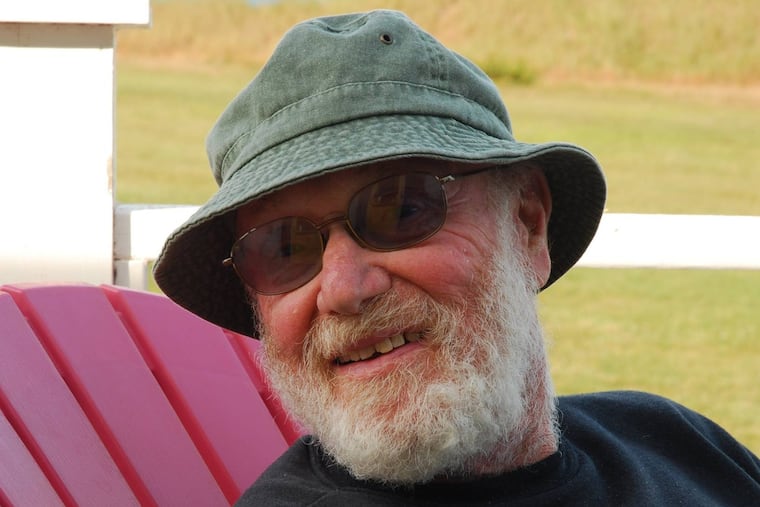Donald Rackin, retired Temple professor and award-winning author, has died at 89
He was a scholar of English literature, an expert on author Lewis Carroll, and known by colleagues for "his seriousness of purpose, eloquence, wit, smile, and laugh."

Donald Rackin, 89, of Philadelphia, retired professor of English at Temple University, scholar of Victorian literature, and award-winning author, died Wednesday, Nov. 23, of Parkinson’s disease at his home in Roxborough.
Professor Rackin taught classes in English literature at Temple for 33 years and was known by students, fellow professors, and staff for his innovative ideas, endearing personality, and dedication to scholarship. Many students credited him with their success after college, and colleagues called him a “professional father,” “model adviser,” and “extraordinarily supportive mentor.”
Forever seeking ways to improve the educational experience for both students and teachers, he founded and directed the Teaching Improvement Center and Senior Mentoring Service at Temple, which enlisted retired professors as mentors and matched them with younger teachers. “We pair them up and leave them alone,” Professor Rackin told the New York Times in 1991, referring to the Senior Mentoring Service.
“Everyone has an ‘impostor’ syndrome, that they’re not as good as it seems, and they don’t want anyone to know their secrets,” he said of younger professors. “The great thing about this is that the mentors are not professors anymore and don’t vote on you for tenure, salary, or promotion.”
He served on the executive committee of the Temple Association of University Professionals, and a union colleague called him “a fierce advocate for the faculty at Temple and elsewhere.” In a tribute, a friend said that Professor Rackin was “a successful academic who knew how to have fun, someone who valued people above all else.”
Professor Rackin wrote poetry and short stories throughout his life. He published and reviewed articles and essays about Victorian literature and other topics, was an expert on English author Lewis Carroll, and edited many publications, including Temple’s Faculty Herald and Academe, the journal of the American Association of University Professors.
He wrote books about Carroll’s work, including 1991′s Alice’s Adventures in Wonderland and Through the Looking Glass: Nonsense, Sense and Meaning, and won the Modern Language Association’s 1967 William Riley Parker Prize for his essay “Alice’s Journey to the End of Night.” He also lectured about Carroll and other English literature across the country, in England, Israel, and elsewhere around the world, and appeared on radio and TV programs.
In 1982, Marshall Ledger, of the University of Pennsylvania’s Pennsylvania Gazette, reviewed Lewis Carroll, A Celebration for The Inquirer and said Professor Rackin’s essay in the book “stands almost alone in seeing Carroll broadly. He does not demean or ignore the comedy but sees it as a crucial part of Carroll’s disillusioned view of the world and cosmic order.”
Professor Rackin served on the board of the Lewis Carroll Society of North America, and its members said in a tribute: “Don was a warm, gentle soul with a fierce intellect always lurking behind his marvelous sense of humor.”
Born Feb. 24, 1933, in Newark, N.J., Donald Rackin graduated from West Side High School, spent three years at New York University, and graduated from Rutgers University with a bachelor’s degree in English in 1954. He earned a master’s degree in English at Columbia University in 1955, taught for a few years at Auburn University, and received a doctorate in English from the University of Illinois in 1964.
He moved to Philadelphia in 1962 to teach at Temple and retired in 1995.
Professor Rackin met Phyllis Finkelstein at Bradley Beach in New Jersey, and she was impressed with his interest in books, art, and music. They married in 1954, had daughters Rebecca and Ethel, and lived in West Philadelphia, Germantown, and Roxborough.
He volunteered with the Greater Philadelphia Coalition against Hunger and the Coming of Age seniors program, supported civil rights and women’s rights, and opposed nuclear proliferation and war. He told The Inquirer at a 2003 candlelight vigil to protest the war in Iraq: “We’re here because war is a terrible, foolish idea.”
He took a course in Yiddish after he retired and loved the poem “God’s Grandeur” by Gerard Manley Hopkins and the song “Morning Has Broken” by Cat Stevens. “Don had a brilliant mind and a ready wit,” his family said in a tribute. “But those who knew him cherished him most of all for his warm heart and generous spirit.”
He was good at carpentry, cooking, painting, and photography, and was the best jitterbug dancer in his high school class. He liked to fish and sail and spent idyllic summers on Prince Edward Island in Canada.
“He was brilliant and creative,” his wife said. “He had a warmth and goodness that radiated off him that people could sense.”
In addition to his wife and daughters, Professor Rackin is survived by a grandson and other relatives. Two brothers died earlier.
A celebration of his life is to be held at 1 p.m., Sunday, April 23, at Laurel Hill Funeral Home, 225 Belmont Ave., Bala Cynwyd, Pa. 19004.
Donations in his name may be made to the Parkinson’s Foundation, 200 SE 1st St., Suite 800, Miami, Fla. 33131, and the Greater Philadelphia Coalition Against Hunger, 123 Chestnut St., Suite 401, Philadelphia, Pa. 19106.